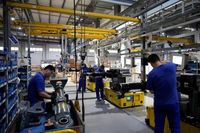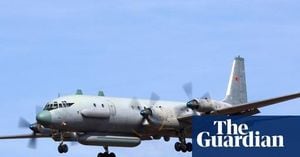On April 12, 2025, workers in a factory for Christmas goods in eastern China are uniting their efforts in the face of American tariffs imposed by Donald Trump. As spring temperatures rise, employees at a factory in Yiwu, a major manufacturing center, are busy assembling Christmas trees, painting plastic pine needles white. This surge in production comes amid escalating trade tensions, as President Trump recently raised tariffs on Chinese goods to a staggering 104%, with indications that they could reach as high as 145% in the near future.
Jessica Gao, the factory director, expressed initial concerns about the impact of these tariffs on the export sector. "In the beginning, there was some pessimism in the sector," Gao told France Press. However, she noted a shift in sentiment over the past few days, stating, "We have become more united, feeling that we cannot succumb to this pressure. We are ready to overcome this difficult stage with the country." This sense of solidarity is echoed across other factories in the region, as they brace for the economic fallout.
The Chinese government is also retaliating against the tariffs, raising its own economic tariffs to 125%. The World Trade Organization has warned that these escalating measures could reduce trade between the United States and China by as much as 80%. The effects of these tariffs are already evident in Gao's factory, where American orders have dried up, leaving many production lines idle.
Gao revealed that two other Christmas goods factories are feeling the pinch as well, although the impact is not as severe in Guangdong province, where larger American clients can dominate production. "In reality, over the past few years... we have rarely encountered any American clients," she said, highlighting a gradual shift away from dependence on the U.S. market. Instead, her factory is exploring new markets, indicating a proactive approach to the challenges posed by the tariffs.
Meanwhile, at a smaller factory specializing in solar-powered plastic tools, sales to American customers have plummeted from 80% before the pandemic to just 20% now. The factory's sales representative, Casey, noted that many orders have been delayed or canceled due to the tariffs. "Initially, some of our American clients said they could bear the increase together, but later, the tariffs rose excessively, and no one could bear that," she explained. This uncertainty has left workers in a state of anticipation, waiting to see what decisions Trump will make next.
Despite these challenges, production continues. Workers at Casey's factory are busy processing colorful plastic pieces through machines, executing each task with precision. Casey showcased models of Trump figurines destined for Europe, expressing her disbelief at the tariffs' rationale. "I believe he should not be this crazy. Imposing tariffs on us brings them no benefit," she stated, reflecting a sentiment shared by many in the industry.
The wholesale market in Yiwu is one of the largest in the world, featuring tens of thousands of stalls selling everything from electronics to body decorations, toys, and artificial grass. Most sellers have diversified their customer base, reaching markets from South America to the Middle East and Southeast Asia. Wang Shushu, a seasoned trader, emphasized the need for resilience in the face of escalating trade tensions. "If the trade war escalates, we have to deal with it confidently. Many will develop new products for other countries," she stated.
In a nearby costume shop, a display of masks features famous villains, including Donald Trump himself. Wang noted that the Chinese people are coming together in response to these economic pressures. "We are more diligent and frugal... we are not afraid of entering a price war; we have great confidence in ourselves," she asserted, showcasing a resilient spirit among the traders.
The unfolding trade war has not only disrupted supply chains but also forced manufacturers to rethink their strategies. As tariffs threaten to reshape the landscape of international trade, factories in Yiwu are adapting by seeking alternative markets and diversifying their production lines. The ability to pivot in such uncertain times reflects the tenacity of these manufacturers, who are determined to weather the storm.
In conclusion, as American tariffs continue to rise, Chinese manufacturers are uniting in their response, showcasing resilience and adaptability in the face of economic adversity. The situation remains fluid, with manufacturers closely monitoring developments and adjusting their strategies accordingly. The future of trade between the two nations hangs in the balance, as both sides grapple with the consequences of escalating tariffs.




